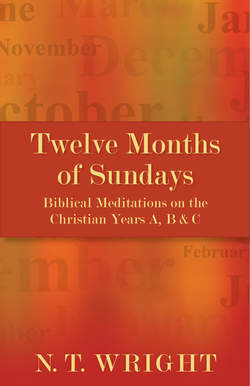Читать книгу Twelve Months of Sundays - N.T. Wright - Страница 29
На сайте Литреса книга снята с продажи.
ОглавлениеThe Second Sunday of Lent
Genesis 12.1–4a
Romans 4.1–5, 13–17
John 3.1–17
‘Leave country, kin and home, and go.’ And Abram went. The call was like that other word, to leave and cleave, spoken before the Fall: a marriage vow, a challenge and a pledge of loyalty. Like, too, the older word to image-bearing Adam, and to Eve: be fruitful, multiply, and tend the garden. Now: I’ll make you fruitful – bless, through you, the world of thorns and thistles. Abraham, father of us all.
Paul’s question, then, is not ‘what Abraham gained’, or ‘found’. Repunctuate (there were, of course, no marks, or even spaces, in the early texts): ‘What shall we say? Have we found Abraham to be our forefather in terms of flesh?’ Paul’s question comes, of course, from his insistence that God’s faithfulness is now unveiled, fulfilled, in Jesus Christ. Does this mean, then, that those who come to faith in Christ must join the fleshly, ethnic family founded by Abraham?
No. This family is not marked out by works of Jewish law. The law, as Paul made clear, discloses only sin, leading to wrath. The promise stands outside that scheme, opening the wider world before the patriarch long before the giving of the law. Paul’s mind leaps over the intervening scheme of Torah, holy land, ethnic restriction, seeing instead the glittering promise in the early dawn of Israel’s ancestry. ‘He would inherit the world’: a line drawn from this point reaches right into Romans 8.
And how would Abraham’s family attain their promised land? Through Exodus, marking them out as liberated slaves, God’s freedom-people (Genesis 15).
The good news, then: Abraham is father not of one nation merely, but of all, all who now share his faith in God the life-giver. ‘The father of us all’: 4.16 (which doesn’t need a bracket, as some versions think) gives the climactic answer to the question of verse 1. With this, Paul’s argument is nearly done: this is how the one true God has been, in Christ, faithful to what he’d promised. From here, he too will journey on, through water (chapter 6) and Spirit (8) to the larger promised land. When, finally, he opens up the sight of cosmic liberty, creation free at last from death, part of the point is ‘This, then, was what God promised Abraham’.
What then of Jesus, and his night encounter with the puzzled teacher? ‘New birth’, in Jewish ears, meant a new family: leaving the old, cleaving to something new. Abraham’s family redefined, out-nomading the old nomad. Water and Spirit, baptism and faith. Israel took its shape from Exodus and Sinai, sea and fire, its healing from the strange bronze serpent. Now, a new covenant: the love of God, not Israel’s private boast, but for the world. All is revealed in one who left his father’s home and went where he was told. ‘So must the Son of Man be lifted up.’ God is now newly working: everyone, all who believe, will share the glory of the age to come.
